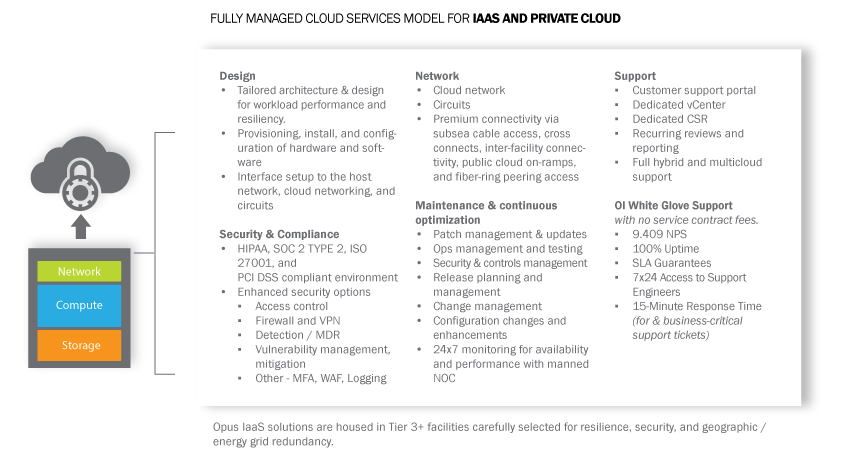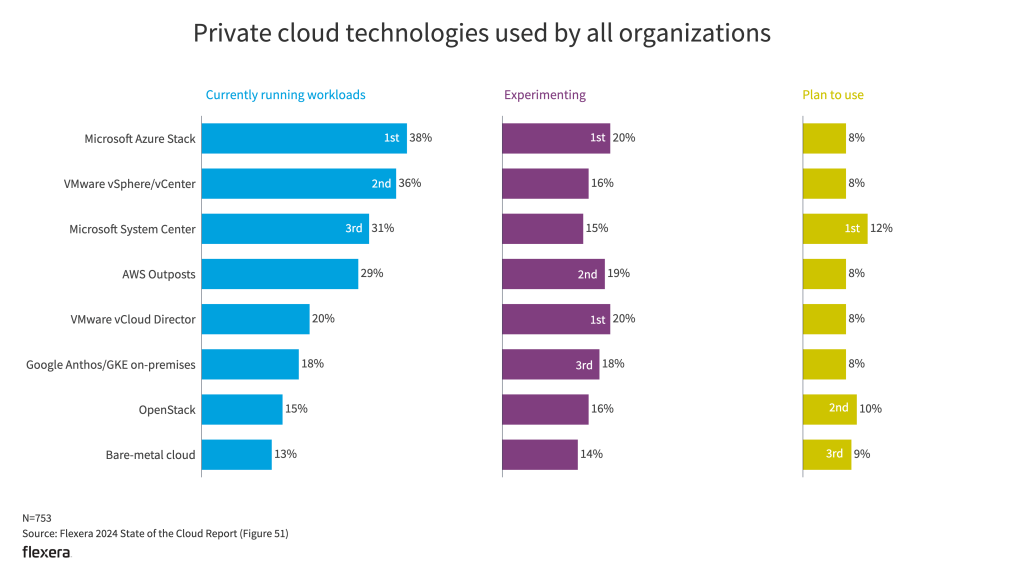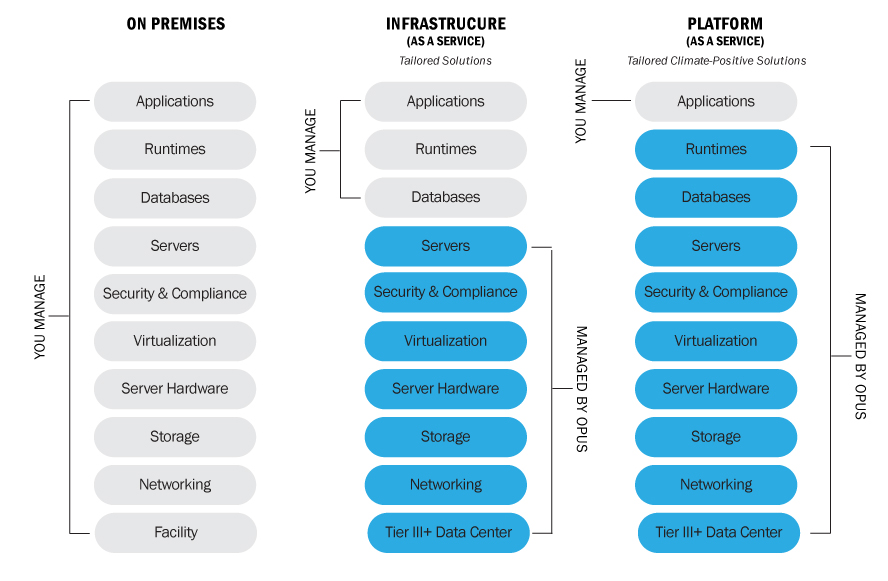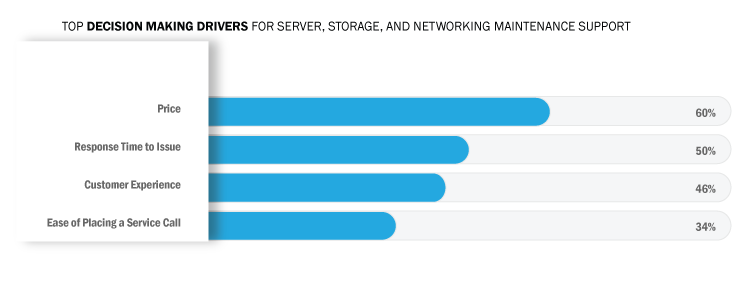8135 NE Evergreen Parkway, Suite 1220, Hillsboro, OR 97124
400 S. Akard Dallas, TX 7520
11680 Hayden Rd Manassas, VA 20109
8135 NE Evergreen Parkway, Suite 1220, Hillsboro, OR 97124
400 S. Akard Dallas, TX 7520
11680 Hayden Rd Manassas, VA 20109

Most organizations have adopted a multi-cloud, hybrid approach, where private cloud plays an essential role. According to Flexera’s 2024 State of the Cloud Report, 36% of organizations use VMware vSphere/vCenter private cloud, up from 28% YoY. This growth reflects businesses embracing the profound impact that IAAS, as part of hybrid and multicloud strategies, can have on operations. By leveraging the scalability and flexibility of cloud technology, enterprises can optimize processes, boost productivity, and stay ahead in a competitive market environment where agility and adaptability are key.
Among the diverse array of cloud services available, Infrastructure as a Service (IaaS) stands out as a cornerstone. Offering increased performance, flexibility, scalability, and cost-effectiveness. Selecting the right IaaS service provider is key. In this comprehensive guide, we’ll take a deep dive into the aspects of IaaS, explore the multifaceted role of service providers, and spotlight Opus Interactive as the premier choice for enterprises seeking to unlock the full potential of cloud infrastructure.
Cloud computing has revolutionized the way businesses manage their IT infrastructure. Infrastructure as a Service (IaaS) represents a paradigm shift to scalable, on-demand storage, process, and compute over capital intensive models of owning and managing infrastructure.

IaaS enables businesses to offload the management of physical infrastructure to third-party service providers, this in turn provide virtual resources such as servers, storage, and networking on a pay-as-you-go basis. This model not only eliminates the need for costly upfront investments in hardware, but it also provides businesses with the agility and flexibility to scale resources up or down and eliminate the day-to-day management of infrastructure, allowing their teams to focus on core business services.
There are a number of infrastructure technologies for organizations to choose from. While Azure is the current leader, VMware has seen growth in the past year among enterprise customers. The growing utilization of vSphere/vCenter paints a clear picture, the bursage trends underscore the enduring appeal and significance of VMware’s products. This indicates that enterprises are not quick to part ways with these trusted solutions after speculation following the Broadcom acquisition and changes to the legacy partner program. Transitioning to the invitation-only model.


IaaS service providers play a pivotal role in enabling businesses to leverage the benefits of cloud infrastructure. Beyond simply provisioning virtualized resources, service providers are tasked with a myriad of responsibilities aimed at ensuring the reliability, security, and performance of their infrastructure offerings.
At the core of their responsibilities, IaaS service providers are tasked with provisioning and managing the underlying infrastructure required to support businesses’ critical workloads and applications. This includes deploying virtual servers, storage volumes, and networking resources, as well as ensuring optimal performance, reliability, and availability.
One of the defining features of IaaS is its inherent scalability and elasticity, allowing businesses to scale resources up or down in response to fluctuating demand. Service providers must design their infrastructure to accommodate rapid scaling, whether it’s provisioning additional compute resources to handle peak workloads or expanding storage capacity to accommodate growing data volumes.
Security is a paramount concern for businesses entrusting their data and applications to third-party service providers. IaaS service providers must implement robust security measures to protect their customers’ sensitive information from unauthorized access, data breaches, and cyber threats. This includes deploying firewalls, intrusion detection systems, encryption mechanisms, and adhering to industry-specific compliance standards and regulations.
Service providers must optimize the performance of their infrastructure to deliver consistent, high-performance computing experiences for their customers. This involves leveraging advanced technologies such as load balancing, caching, and content delivery networks (CDNs) to minimize latency, maximize throughput, and enhance the overall user experience.
Disaster recovery and business continuity are critical considerations for businesses operating in today’s interconnected world. IaaS service providers play a pivotal role in ensuring the resilience and availability of their customers’ applications and data by implementing robust backup and recovery solutions, failover mechanisms, and geographically distributed data centers to mitigate the risk of downtime and data loss.
Exceptional customer support is a hallmark of reputable IaaS service providers. From onboarding and deployment to ongoing maintenance and troubleshooting, service providers must offer round-the-clock technical support and customer service to address their customers’ needs and resolve any issues or concerns in a timely and efficient manner.
Finding the right cloud services partner can be a daunting task for enterprise customers. In a crowded marketplace teeming with IaaS providers, Opus Interactive distinguishes itself through its unwavering commitment to excellence, innovation, and customer satisfaction.
Let’s explore some of the key reasons why Opus Interactive stands out as the premier choice for businesses seeking a reliable and innovative IaaS partner:

The cost of downtime and cloud sprawl can make or break an organization’s IT budget. Opus Interactive has a 28+ year proven track record of delivering industry-leading uptime and performance, thanks to its state-of-the-art infrastructure, redundant network connectivity, and robust SLAs (Service Level Agreements) that guarantee reliability and availability. By partnering with Opus Interactive, businesses can rest assured that their critical workloads and applications are housed on tailored solutions right sized for their unique needs and will remain accessible and responsive at all times.
Opus has a 100% CSAT and 9.409 NPS. With Opus Interactive, businesses can scale resources up or down on-demand, without any disruptions to their operations. Whether it’s scaling compute, storage, or networking resources, Opus Interactive offers unparalleled flexibility and agility to meet the evolving needs of its customers. By leveraging Opus Interactive’s scalable infrastructure, businesses can easily accommodate growth, handle spikes in demand, and adapt to changing market conditions with ease.
Opus Interactive places a premium on the security and privacy of its customers’ data and applications. Through a comprehensive suite of security measures, including ecosystem monitoring, MDR, advanced encryption, multi-factor authentication, and adherence to industry-specific compliance standards such as HIPAA, ISO 27001, PCI DSS, and SOC 2, Opus Interactive ensures that its customers’ sensitive information remains protected against unauthorized access, data breaches, and cyber threats. Added business continuity measures include backup and disaster recovery and operations from world class facilities located across three separate regions and energy grids for maximum reliability.
Opus has spent nearly 30 years developing strong partnerships with world class providers across the cloud and data center network to enable customers to have seamless service with best in class offerings to enable hybrid and multi-cloud solutions, cloud monitoring, cloud security, business continuity, and network. The company delivers solutions from tier 3 facilities and offers services for all top cloud technologies. Opus Interactive is also an approved Premier Broadcom partner and approved white label service provider in the revamped program.
Sustainability is a core value at Opus Interactive. As a socially responsible company, Opus Interactive is committed to minimizing its environmental footprint by leveraging net zero facilities, right-sized environments, energy-efficient infrastructure, and promoting sustainable business practices. By choosing Opus Interactive as their IaaS provider, businesses can align their IT infrastructure needs with their sustainability goals and contribute to a greener, more sustainable future.
Opus Interactive believes in giving back to the community and making a positive impact on society. Through its various social responsibility programs and initiatives, Opus Interactive actively supports local charities, volunteers in community service projects, and advocates for environmental conservation and social justice. By partnering with Opus Interactive, businesses can join forces with a company that shares their values and is committed to making a difference in the world.
In conclusion, choosing the right IaaS service provider is a decision that can have a huge impact on your business’s success. By understanding the evolving landscape of IaaS, evaluating key factors such as reliability, scalability, security, and customer-centricity, businesses can make informed decisions that align with their objectives and growth aspirations. With its unwavering commitment to excellence, innovative solutions, and values-driven approach, Opus Interactive emerges as the ideal partner for businesses seeking to harness the power of cloud infrastructure to drive innovation. They are also the ideal partner to accelerate growth and stay ahead of the competition; by choosing Opus Interactive as their trusted IaaS service provider, businesses can embark on a transformative journey towards success, resilience, and sustainability in the digital age.